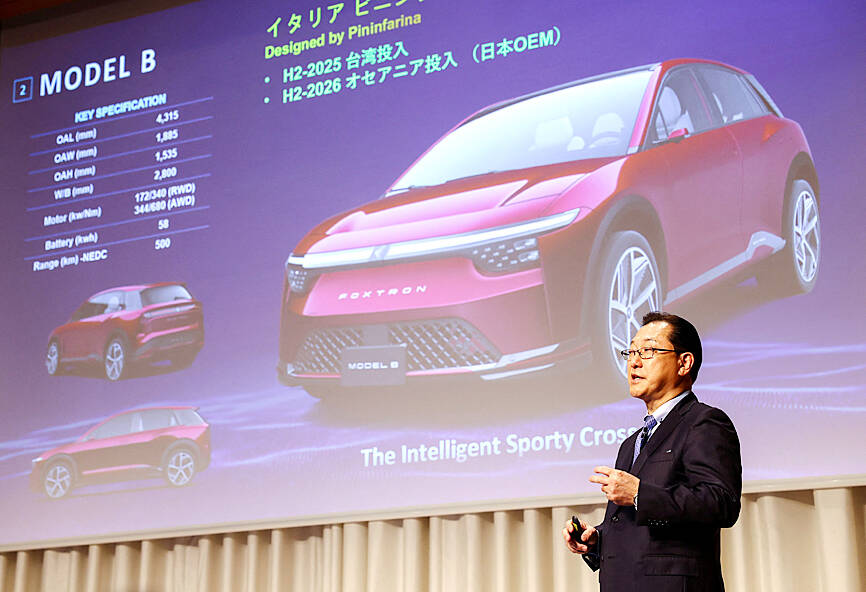Hon Hai Precision Industry Co (鴻海精密) wants Japan’s automakers to know it is willing to assemble electric vehicles (EVs) for them, similar to how it makes PlayStations for Sony Group Corp and iPhones for Apple Inc, and expects to announce partners in the near future.
While Foxconn Technology Group (富士康科技集團), as the company is known outside Taiwan, is well known as the world’s largest contract manufacturer and the owner of Sharp Corp, more work needs to be done to raise its profile as a potential builder of cars, according to Hon Hai chief strategy officer for EV business Jun Seki.
“What we want to have is more awareness in Japan,” Seki said in an interview. “Foxconn is famous as smartphone builders and also for the acquisition of Sharp, but nothing else.”

Photo: Reuters
Seki, a former Nissan Motor Co and Nidec Corp executive, is embarking on a charm offensive as he seeks to attract more customers willing to outsource their EV manufacturing.
Foxconn is betting that many would need to do so in the coming years in order to cope with the huge costs and risks involved in making the transition from fuel-burning vehicles.
The company held a news conference in Tokyo yesterday to detail some of the products it is building and to explain its broader strategy.
Although Seki declined to name specific partners that are yet to be announced, he said that electrified cars and buses the company makes would appear on the roads in Japan and the US over the next few years.
Hon Hai has secured an agreement to make EVs for Mitsubishi Motors Corp, Bloomberg and Japanese media reported last month.
In February, Hon Hai chairman Young Liu (劉揚偉) said the company had approached Nissan and Honda Motor Co about potential cooperation, as the two were involved in merger talks that were eventually abandoned.
“Within one year you can expect several Japanese partners,” Seki said.
Despite the flurry of recent activity, EV contract manufacturing is still too small to be reported as its own segment in the company’s sales results. That would change over time as more automakers see the benefits of outsourcing their manufacturing and Hon Hai builds capacity in factories across the globe, Seki said.
The Taiwanese manufacturer is building or refurbishing facilities in the US, Taiwan and Thailand, while also seeking to expand capacity in India and the Middle East.
For Japan, the company would be interested in expanding EV production by using existing plants, some of which might be seeing excess capacity as more automobile production shifts to the US in order to cope with broad tariffs being imposed under US President Donald Trump’s administration, Seki said.
Some discussions are taking place, and building new factories in Japan is also an option, he added.
However, the company first needs to show that it can build cars for others cheaply and effectively, Seki said.
Winning over automakers that still see manufacturing know-how as the core of their business is not easy, he said.
“Our company sales size is over US$200 billion, but this revenue only comes because of trust from customers,” Seki said. “We receive their highly confidential information, but we have had no incidents at all. That’s why like Apple, Sony trust us and ask us to build their facility. That’s what we want to emphasize.”

NEW IDENTITY: Known for its software, India has expanded into hardware, with its semiconductor industry growing from US$38bn in 2023 to US$45bn to US$50bn India on Saturday inaugurated its first semiconductor assembly and test facility, a milestone in the government’s push to reduce dependence on foreign chipmakers and stake a claim in a sector dominated by China. Indian Prime Minister Narendra Modi opened US firm Micron Technology Inc’s semiconductor assembly, test and packaging unit in his home state of Gujarat, hailing the “dawn of a new era” for India’s technology ambitions. “When young Indians look back in the future, they will see this decade as the turning point in our tech future,” Modi told the event, which was broadcast on his YouTube channel. The plant would convert

‘SEISMIC SHIFT’: The researcher forecast there would be about 1.1 billion mobile shipments this year, down from 1.26 billion the prior year and erasing years of gains The global smartphone market is expected to contract 12.9 percent this year due to the unprecedented memorychip shortage, marking “a crisis like no other,” researcher International Data Corp (IDC) said. The new forecast, a dramatic revision down from earlier estimates, gives the latest accounting of the ongoing memory crunch that is affecting every corner of the electronics industry. The demand for advanced memory to power artificial intelligence (AI) tasks has drained global supply until well into next year and jeopardizes the business model of many smartphone makers. IDC forecast about 1.1 billion mobile shipments this year, down from 1.26 billion the prior

People stand in a Pokemon store in Tokyo on Thursday. One of the world highest-grossing franchises is celebrated its 30th anniversary yesterday.

Zimbabwe’s ban on raw lithium exports is forcing Chinese miners to rethink their strategy, speeding up plans to process the metal locally instead of shipping it to China’s vast rechargeable battery industry. The country is Africa’s largest lithium producer and has one of the world’s largest reserves, according to the US Geological Survey (USGS). Zimbabwe already banned the export of lithium ore in 2022 and last year announced it would halt exports of lithium concentrates from January next year. However, on Wednesday it imposed the ban with immediate effect, leaving unclear what the lithium mining sector would do in the